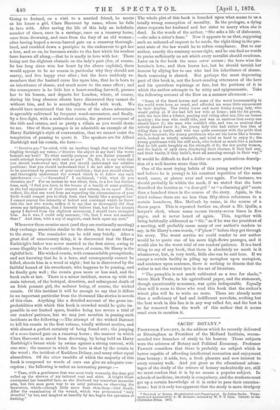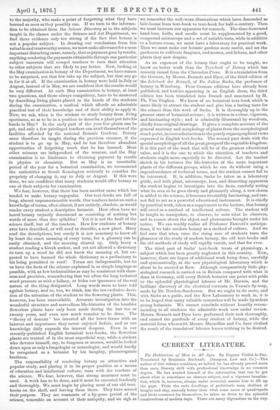SACHS' BOTANY.*
PROFESSOR FAwcErr, in the address which he recently delivered at Birmingham as President of the Midland Institute, recom- mended two branches of study to his bearers. Those subjects were the sciences of Botany and Political Economy. Professor Fawcett considers that there is probably no subject which is better capable of affording intellectual recreation and enjoyment than botany ; it adds, too, a fresh pleasure and new interest to every country walk. And yet great as the educational advan- tages of the study of the science of botany undoubtedly are, still we must confess that it is by no means a popular subject. In schools of medicine, its study is compulsory, and the students must get up a certain knowledge of it in order to pass their examina- tions; but it is only too apparent that the study is mere drudgery Text-boat of Botany, Morphological and Physiological. By Julius Sachs. Trans- lated and Annotated by A. W. Bennett, assisted by W . T. T. Dyer. Oxford: at the Clarendon Prem. 1875. to the majority, who make a point of forgetting what they have learned as soon as they possibly can. If we turn to the informa- tion to be obtained from the Science Directory as to the subjects taught in the classes under the Science and Art Department, we find there evidence only too strong of the fact that botany is not a popular subject. In drawing our conclusions from this valuable and trustworthy source, we.must make allowance for a most important disturbing cause, namely, that as payment goes by results, -anything rendering the payments obtainable through one particular subject uncertain will compel teachers to turn their attention to other subjects that are likely to pay better. Now, looking at -the May examination hibotany of the Department, we have reason to be surprised, not that few take up the subject, but that any go in for it at all. If the examination in botany were held in July or August, instead of in May, we are confident that the results would be very different. At each May examination in botany, at least two questions, and those always compulsory, have to be answered by describing living plants placed in the hands of the students during the examination, a method which affords an admirable practical test of their knowledge and of their ability to apply it. Now, we ask, when is the student to study botany from living specimens, so as to be in a position to describe a plant put into his hands in May ? In the early part of the year few plants can be got, and only a few privileged teachers can avail themselves of the facilities afforded by the national Botanic Gardens. Botany must therefore be taught during the previous summer, if the student is to go up in May, and he has therefore abundant opportunities of forgetting much that he has learned. Most -other sciences are independent of the seasons, and the May examination is no hindrance to obtaining payment by results in physics or chemistry. But as May is an unsuitable period of the year for a botanical examination, we recommend the authorities at South Kensington seriously to consider the propriety of changing it, say to July or August. If this were -done, we are confident that many students would offer botany as -one of their subjects for examination.
We fear, however, that there has been another cause which has tended to make botany unpopular. Our text-books are full of long, almost unpronounceable words. Our teachers insist on such a knowledge of terms, often almost, if not entirely, obsolete, as would render every student a descriptive botanist. How often have we heard botany unjustly denounced as consisting of nothing but words of more than five syllables ! Yet it is not the fault of the science itself, but of the teachers. How few students of botany ever have described, or will need to describe, a new plant. Many read the descriptions, but surely it is not necessary to know all by heart the exact meaning of every term, for a glossary can be -easily obtained, and the meaning cleared up. Only fancy a student reading a Greek author, and yet not allowed a dictionary to turn up a word he did not know the meaning of, but ex- pected to have learned the whole dictionary as a preliminary to hia being permitted to read ! Terms are indispensable, but let us have the facts of the science explained in as simple language as possible, with as few technicalities as may be consistent with clear- ness and precision, remembering that too often the long technical word presents us with a fallacy, or hides our ignorance of the real nature of the thing designated. Long words seem to have told against botany, and so, too, we think, has the too exclusive devo- tion of the attention of the student to the flowering plants. This, however, has been unavoidable. Accurate investigation into the wonderful structure and marvellous life-histories of the humbler flowerless plants have only been made during the last ten or twenty years, and even now much remains to be done. The "theory of descent" has invested all the lower forms with an interest and importance they never enjoyed before, and as our knowledge daily expands the interest deepens. Even in our recently-published English botanical text-books, the flowerless plants are treated of in the most superficial way, while a student who devotes himself, say, to funguses or mosses, would be looked down upon as only a fungologist or muscologist, and would hardly be recognised as a botanist by his haughty, phemerogamic brethren.
The responsibility of rendering botany an attractive and popular study, and placing it in its proper position as a means of education and intellectual culture, rests with the teachers of the science. We fear, however, that strong measures must be used. A work has to be done, and it must be executed fearlessly and thoroughly. We must begin by placing most of our old text- books on the shelf, and leaving them there. They have served their purpose. They are remnants of a by-gone period of the science, venerable on account of their antiquity, and we sigh as we remember the well-worn illustrations which have descended as heir-looms from text-book to text-book for half-a-century. Then we must increase our apparatus for research. The time-honoured hand-lens, knife, and needle must be supplemented by a good, compound microscope and a set of suitable tests, while in addition to a lecture-room, we must have a laboratory for practical work. Then we must make our botanic gardens more useful, and set the gardeners to cultivate funguses, and mosses, and lichens, and other plants they now despise.
As an exponent of the botany that ought to be taught, we know no better work than the Text-book of Botany which has recently issued from the Clarendon Press. It is a translation from the German, by Messrs. Bennett and Dyer, of the third edition of the Lehrbuch der Botanik, of Dr. Julius Sachs, the professor of botany in Wilrzburg. Four German editions have already been published, and besides appearing in an English dress, the third edition has been translated into French and annotated by M. Ph. Von Tieghen. We know of no botanical text-book which is more likely to attract the student and give him a lasting taste for the science than this work of Sachs. It is thoroughly up to the present state of botanical science ; it is written in a clear, vigorous, and fascinating style ; and is admirably illustrated by woodcuts, chiefly from original drawings. It gives a complete account of the general anatomy and morphology of plants from the morphological stand-point, in contradistinction to the purely organographical views expressed in English text-books. The second part deals with the special morphology of all the great groups of the vegetable kingdom. It is this part of the work that will be of the greatest educational value, and it is the one to which the attention of teachers and students ought more especially to be directed. Let the teacher sketch in his lectures the life-histories of the more important plants of the different groups, which he can do without using a superabundance of technical terms, and the student cannot fail to be interested. If, in addition, Sachs be taken as a laboratory guide, and with plant, microscope, lens, and dissecting-apparatus the student begins to investigate into the facts, carefully noting what he sees as he goes slowly and pleasantly along, a new charm is added to the science, it becomes irresistibly fascinating, and can- not fail to act as a powerful educational instrument. It is chiefly by practical work, taken as a supplement to the lecture, that botany will excel as a method of intellectual culture. The student will be taught to manipulate, to observe, to note what he observes, and to reason about the object and phenomena brought under his notice. We can readily realise all Professor Fawcett's anticipa- tions, if we take modern botany as a method of culture. And we feel sure that when once the rising race of students taste the pleasures of the study of modern botany, the old text-books and the old methods of study will rapidly vanish, and that for ever.
The third part of Sachs' text-book treats of physiology, a subject which has been greatly neglected in this country. Now, however, there are hopes of additional work being done, carefully and systematically, at the new physiological laboratory which is about to be erected at Kew. Although comparatively little phy- siological research is carried on in Britain compared with what is done in Germany, still every British botanist can point with pride to the splendid physiological labours of Mr. Darwin, and the brilliant discovery of the electrical currents in Venus's fly-trap, made by Dr. Burdon-Sanderson. But we ought to do more, and with Sachs as a guide, and the Kew Laboratory to work in, it is to be hoped that many valuable researches will be made by ardent young botanists. We cannot conclade without heartily recom- mending to all students the admirable work now under review. Messrs. Bennett and Dyer have performed their task thoroughly, and earned the gratitude of every student of botany, while the material form wherewith Messrs. Macmillan and Co. have clothed the result of the translators' labours leaves nothing to be desired.



































 Previous page
Previous page